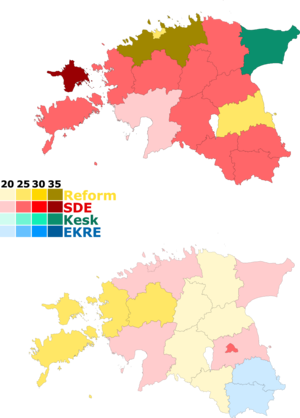| ||||||||||||||||||||||||||||||||||||||||||||||||||||||||||||||||||||||||||||||||||
All 6 Estonian seats to the European Parliament (+1 when the new apportionment was implemented) | ||||||||||||||||||||||||||||||||||||||||||||||||||||||||||||||||||||||||||||||||||
|---|---|---|---|---|---|---|---|---|---|---|---|---|---|---|---|---|---|---|---|---|---|---|---|---|---|---|---|---|---|---|---|---|---|---|---|---|---|---|---|---|---|---|---|---|---|---|---|---|---|---|---|---|---|---|---|---|---|---|---|---|---|---|---|---|---|---|---|---|---|---|---|---|---|---|---|---|---|---|---|---|---|---|
| Turnout | 37.6% ( | |||||||||||||||||||||||||||||||||||||||||||||||||||||||||||||||||||||||||||||||||
| ||||||||||||||||||||||||||||||||||||||||||||||||||||||||||||||||||||||||||||||||||
 Vote Share in the 2019 European Parliament election in Estonia by most voted (top) and second most voted (bottom) party per county. | ||||||||||||||||||||||||||||||||||||||||||||||||||||||||||||||||||||||||||||||||||
An election for the Members of the European Parliament from Estonia took place on May 26, 2019. [1] Due to the United Kingdom's impending withdrawal from the European Union and the redistribution of its European Parliament seats, the number of elected MEPs from Estonia was increased from six to seven. [2]




